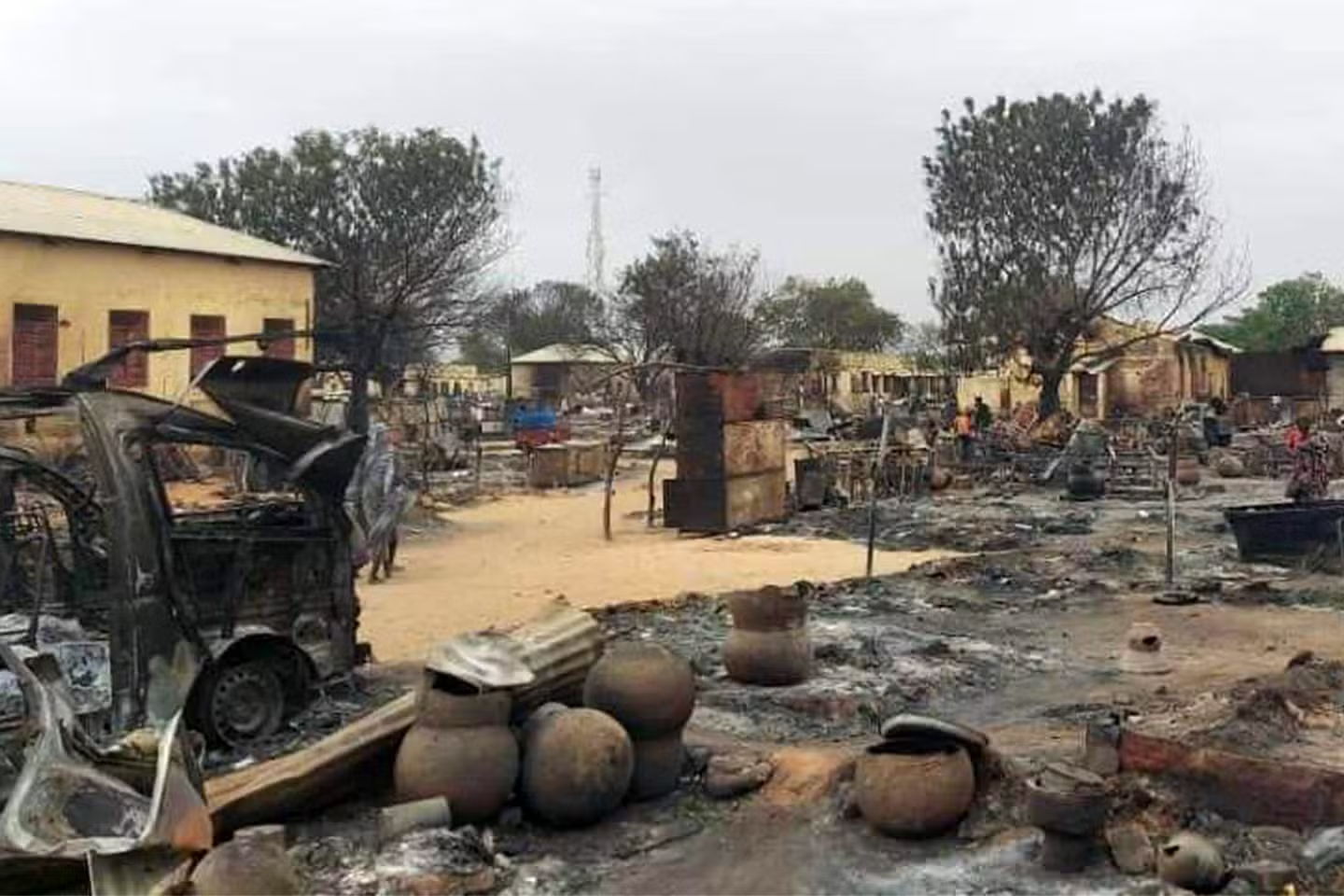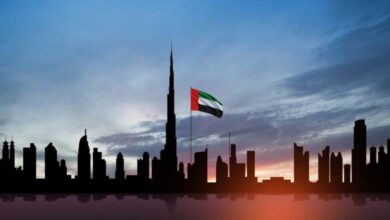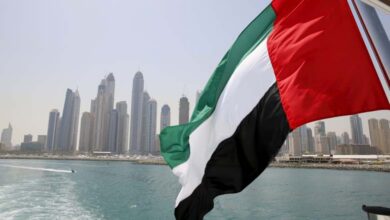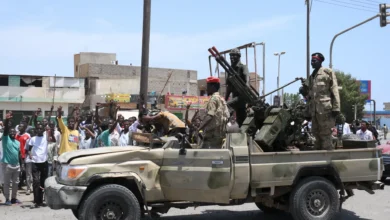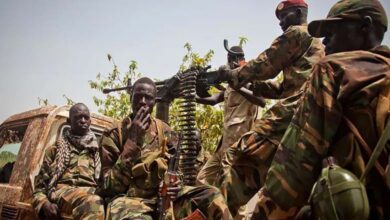Signs of Discord Shake Sudan’s Army and Its Allies… Is the Alliance Falling Apart?
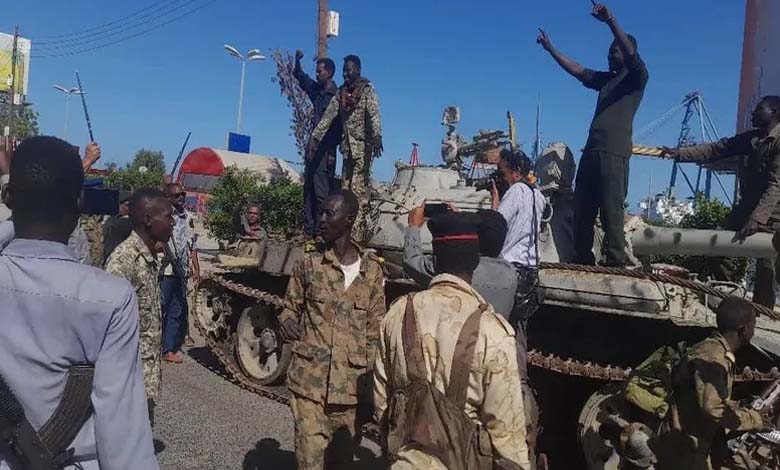
Tensions that had long remained hidden between allies within the Sudanese army’s camp are now erupting and making their way into the public eye.
-
Crisis of Trust between the Sudanese Army and Its Militias… What Lies Behind the Recruitment Freeze Decision?
-
Khartoum: Liberation or Genocide? Sudanese Army Accused of War Crimes
This comes after the Rapid Support Forces (RSF) took control of the “Zamzam” IDP camp and tightened their siege on the city of El-Fasher, the capital of North Darfur in western Sudan.
The RSF announced they had seized Zamzam camp, located 12 km south of El-Fasher, after military clashes that resulted in dozens of civilian deaths and worsened the humanitarian crisis in the overcrowded camp.
This was met with strong condemnation from both regional and international actors, who held both parties in the conflict fully responsible for the ongoing war and its expansion, ignoring repeated international and regional appeals to protect civilians.
-
The Muslim Brotherhood’s Congratulations to the Sudanese Army… A Move That Reveals the Group’s Role in Fueling the Conflict
-
Khartoum’s Liberation Exposes Alliances: Muslim Brotherhood’s Congratulatory Message to the Sudanese Army Raises Questions
International Condemnation
The United Arab Emirates strongly condemned the targeting of displaced persons and aid workers, calling for respect for international law and unimpeded humanitarian access.
The UAE Ministry of Foreign Affairs urged all parties to honor their obligations under international law, the Jeddah Declaration, and the “ALPS” (Allies to Promote Life-Saving and Peace in Sudan) platform, stressing the need for immediate steps to protect civilians and ensure the urgent delivery of aid by all available means, without obstacles.
On Sunday, the Saudi Foreign Ministry expressed the Kingdom’s condemnation and outrage at the attacks on IDP camps in El-Fasher (Zamzam and Abu Shouk), calling them a “violation of international law and international humanitarian law.”
-
The Sudanese Army Committed Horrific Field Executions in Khartoum
-
Human Rights Organizations: Sudanese Army Involved in Summary Executions That Have Claimed Dozens of Civilian Lives
UN Secretary-General António Guterres also condemned the deaths of dozens of civilians in the attacks and emphasized the need to allow civilians to leave El-Fasher safely.
The United States condemned the assaults as well, demanding immediate humanitarian corridors and accountability for those violating international humanitarian law.
Propaganda Campaign
For its part, the RSF denied responsibility for any attacks on civilians, stating on Saturday that it adheres to international humanitarian law. It harshly criticized what it described as a propaganda campaign aiming to tarnish its image and distract from the real crimes being committed against the Sudanese people.
-
Sudanese Army’s Threats to its Neighbors: An Internal Distraction Signaling Regional Dangers
-
Sudanese Army’s Military Gains Undermine Chances of a Peaceful Resolution to the Crisis
The RSF insisted no massacres had occurred in the Zamzam camp, calling the accusations fabricated and inaccurate, and accused the Sudanese army of leading a media campaign against them.
They asserted that their targets are solely military positions and installations used by the Sudanese army and its allies, some of which are allegedly located within the IDP camps.
Mennawi in the Spotlight
An interview aired yesterday on Al Arabiya Al Hadath with the governor of Darfur, Minni Arko Mennawi — commander of the joint forces fighting alongside the army — sparked heated debate across social media platforms.
-
The Sudanese Army and the Use of Chemical Weapons: Recent War Violations and Humanitarian Impact
-
Juba Opens Fire on the Sudanese Army and Its Islamist Militias… Details
Many saw his remarks as signaling dissatisfaction from the joint forces regarding the Sudanese army’s lack of support in breaking the siege on El-Fasher.
When asked about possible talks with RSF Deputy Commander Abdel Rahim Dagalo, Mennawi responded that he separates law from politics and that Dagalo, being a fellow Sudanese, wouldn’t be off-limits for dialogue.
Previously, RSF legal advisor Mohamed Mokhtar claimed that Mennawi had contacted Mohamed Hamdan Dagalo and demanded large sums of money in exchange for fighting alongside the RSF.
-
From Infrastructure Destruction to Arms Smuggling: Analyzing the Sudanese Army’s Manipulation of Facts
-
Sudanese Army’s Statement on Shambat Bridge Destruction: A Desperate Attempt to Polish a Tarnished Image
Army’s Evasion
Observers believe the army’s alliances are filled with contradictions, with factions vying for their own political interests and lacking shared goals — a recipe for internal conflict in the near future.
Journalist and civil society activist Sulafa Abu Dafira stated that Mennawi’s forces are essentially a “rented gun” serving the army’s short-term objectives, and that the alliance is unlikely to last.
She said that it is increasingly clear the army is avoiding support for the joint forces in lifting the siege on El-Fasher, especially as the Muslim Brotherhood — a supporter of the army — manipulates the ethnic and tribal dynamics of the war through a systematic propaganda campaign.
-
Demands for the Dissolution of the Sudanese Army and Pursuit of the Muslim Brotherhood
-
The Flow of Weapons to the Sudanese Army from Foreign Sources… What Is Happening?
She added that the army’s field assessments are also declining due to its difficult military position and the deterioration of its air force capabilities, noting that any movement by remaining army units outside of Khartoum would allow RSF forces stationed in Omdurman to recapture all previously abandoned positions, including the Republican Palace.
According to her, Mennawi’s recent statements reflect the deepening rift between the army and the joint forces.
She did not rule out potential military confrontations between the army and joint forces, nor a possible deal between Mennawi and the RSF in exchange for a safe withdrawal from El-Fasher if the RSF takes full control of North Darfur.
-
The Muslim Brotherhood and the Sudanese Army: A History of Rumor-Mongering
-
Experts identify reasons for the collapse of the Sudanese Army
Cracks in the Military Alliance
Political analyst and journalist Shawqi Abdel Azim said that the army failed to provide military support for the defense of El-Fasher, which angered Mennawi.
explained that the RSF’s advancements in air defense capabilities disrupted the Sudanese army’s strategy, making its leaders reluctant to deploy the air force in the battle for El-Fasher, fearing losses to one of the army’s most vital branches.
He added that the Muslim Brotherhood, which controls key decision-making centers within the army, holds long-standing grudges against the leaders of the armed movements and does not trust them for any long-term alliance.
He concluded: “The Sudanese army’s military alliance is built on competition among its factions for power and wealth — it carries within itself the seeds of its own fracture and collapse.”


